High cost for higher ed
On National Call Congress Day, Nov. 18, WSU students reached out to the U.S. government to voice concerns for issues students face pursuing post-undergraduate education.
December 1, 2015
While the majority of college students struggle with the ever-looming shadow of loans and debt, the load weighs heaviest upon the shoulders of the graduate student.
WSU’s Graduate and Professional Student Association (GPSA) provided all graduate and professional students the opportunity to call and voice their concerns with Washington state senators and representatives on National Call Congress Day, Nov. 18.
National Call Congress Day gives grad students a louder voice. However, it does not fix the problem.
The majority of financial aid issues and dilemmas stem from The Budget Control Act of 2011, said Kathryn Harris, GPSA director of legislative affairs. The act severely cut national funding for graduate student research projects and loans.
“If you are an undergraduate student, you can get something called a subsidized loan, where the federal government pays your interest while you were in school, and then you don’t have to pay any until you are done with school,” Harris said.
Graduate students are no longer allowed to obtain subsidized loans due to the Budget Control Act, Harris said. Students instead may obtain unsubsidized loans, which start accumulating interest as soon as they are accepted.
In addition to the change in loan eligibility, graduate students must also pay an interest rate of around 6.5 percent on unsubsidized loans, while undergraduates pay 4.5 percent. Harris said this does not make any sense, as the default rate for graduate students is 3 times less than that of the average undergraduate student.
“The most interesting statistic to me is that the department of education makes 77 percent of its student loan profits off of the grad students,” said Brittany Wood, a second year Ph.D. student in political science. “We are only responsible for 13 percent of overall borrowing.”
Wood said that, for students such as herself, loans become more challenging due to receiving low stipends. For Wood, this results in not having enough money to pay off the interest.
“I am the first person in my entire family to go to college, never thought I would do a Ph.D. ever, and now that I’m here I’m wondering if I made the right decision,” Wood said. “This is a constant fear, because I could be in the program with five years or more.”
Sequestration also took away a lot of funding from student research, Harris said.
“As graduate students, many of us are here to do research,” Harris said. “You could be doing something as important as developing a medical device to help with Alzheimer’s. We just had a student in here talking about that, and because of sequestration, she had her project cancelled I think once or twice now.”
Accompanying the financial struggle, the biggest fear for graduate students such as Wood and her fiancé Ismal Karabas, a Ph.D. student from Turkey studying marketing, is the struggle regarding green cards and the length of foreign visas.
“His visa is five years, so we are actually planning on getting married this coming summer, things of that sort, and we want to stay in the United States to get jobs,” Wood said.
The issue is that Karabas is expected to find employment as soon as he graduates and his five years are up; otherwise he will have to leave the U.S.
“Some grad students take two years to find jobs,” Wood said. “So if you imagine that you have to search for two years after you graduate to find a job, and we have to leave immediately because his visa is only for five years, then that is also a terrifying prospect for when we graduate.”
Based on conversations with professors, Wood said Karabas was encouraged to obtain a green card before he even partakes in the job market. Otherwise, potential employers may be dissuaded by his visa’s expiration date.
“Getting a green card is a long process, and a difficult process, and an expensive process,” Wood said. “They only allow a certain number of green cards for graduate students each year. So it’s about 60,000.”
With events such as National Call Congress Day, Harris said it is important to make senators and representatives understand what issues professional and graduate students deal with.
“Many of them grew up in a time where you could work during the summer and pay for your tuition and they see graduate school as something of a luxury, something that rich kids get to do and you don’t have to do it,” she said.
Many have to attend graduate or professional school nowadays, she said, in order to become more competitive in the workforce.
“That’s something that has been a continual effort on our part is to frankly educate congress that ‘Yeah, we’re graduate students, but that’s not a luxury anymore,’” Harris said. “That’s what this is about, getting the ball rolling so that actually we can get a bill changed. It’s all about the momentum.”















